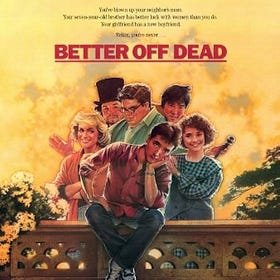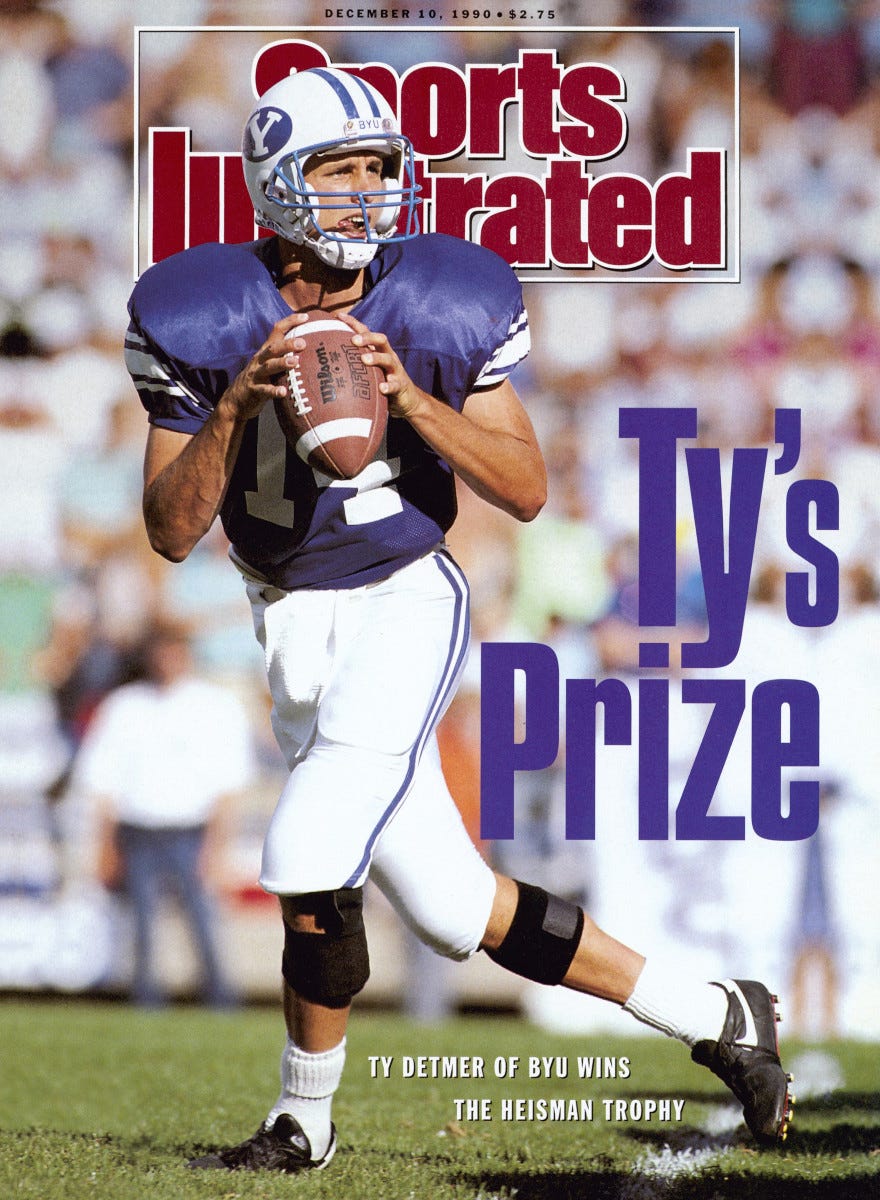Dead Conferences: Part 2, Prologue - Winning Doesn't Solve Everything
A common refrain I heard and read throughout Pac-12 football’s 2023 swan song was that if the conference won more consistently in high-profile spots during the College Football Playoff era, it would have survived.
Maybe. Certainly the revenue from Playoff appearances helps, but I think it’s a naive assumption that misunderstands the motivations behind conference realignment, both in the present day and throughout its history.
Case in point: The Western Athletic Conference.
The first part of this series examined Big West Conference football. The significance of the Big West’s football history is overlooked, but the league was arguably doomed from its outset.
Dead Football Conferences, Part 1 Chapter 1: Big West Football Was Born To Die
Completion of the 2023 college football season effectively signals the end of the Pac-12 Conference. It’s a reality that hasn’t truly sunk in for me. Maybe subconsciously, I’m holding out hope John Cusack will challenge Norby Williamson to a winner-take-all downhill ski race with the Conference of Champions’ fate in the balance, delivering a 23rd-hour m…
Not so for the WAC; at least, not as obviously.
Through multiple iterations, the Western Athletic Conference was arguably the most influential football league outside of the sport’s power brokers. Its impact on the last 50 years of college football is undeniably significant.
And yet, for all its success on the field, WAC football died two separate deaths. The conference’s existence in any form hangs on by a thread in 2024.
Craig Meyer’s The Front Porch offered an excellent look at the WAC’s tumultuous life and ability to survive multiple shifts of the college sports landscape. The most recent round, however, may be its difficult to endure, with Grand Canyon on its way to the West Coast Conference in 2025-26; Stephen F. Austin is going back to the Southland Conference after having a cup of coffee in the WAC and taking UT-Rio Grande Valley with it.
The exits of SFA and UTRGV follow Lamar and Incarnate Word each balking at WAC membership, while Sam Houston took a Conference USA invitation a year ago. They may be harbingers forecasting a Tarleton and Abilene Christian departure. What each of these athletic departments have in common, aside from all being Texas-based, is that all five field football programs. The sixth, UTRGV, plays an exhibition schedule this coming fall before its inaugural varsity campaign in 2025.
The WAC has survived multiple rounds of realignment and major shake-ups to its own structure for almost a half-century. As a football conference, however, it’s been dead for more than a decade.
And WAC football’s demise can’t be pinned on a failure to win. Right through some of its final days as a football-hosting conference, the WAC factored prominently into the national championship and Heisman Trophy discussions.
WAC football ended after the 2012 season, just before the start of the College Football Playoff era in 2014 — a bitter irony, given the various roles that former WAC members played in moving the sport toward a tournament format.
Meanwhile, expansion of the Playoff to 12 teams in 2024 coincides with the 40th anniversary of the last national championship won by an outsider.
Another irony is that national title — belonging to the Steve Young-quarterbacked 1984 BYU Cougars — predates any of college football’s efforts to award real championship. In the four decades since, through the Bowl Alliance and Bowl Coalition, the Bowl Championship Series and the first decade of the Playoff, the road for an outsider to contend arguably became more difficult.
Cincinnati making the 2021 Playoff demonstrated that in order to qualify for one of those four berths, for a program outside of those leagues deemed “power” — or at least, leagues with the most revenue — needed to have consecutive transcendent seasons.
Oh, and the second of those two outstanding seasons — undefeated seems to be the litmus test — should also coincide with an especially chaotic campaign throughout the sport. Just ask UCF, which had the back-to-back undefeated regular seasons in 2017 and 2018, but only got its necessary chaos in 2017 and was thus denied a berth.
More irony: One could present a compelling argument that even the loathed BCS offered a more realistic path to a championship than the Playoff. An outsider never played for the BCS Championship, but former WAC member Utah in 2008 came closer to a split national title via AP voters than UCF in 2017, for example.
Boise State, in its first year post-WAC membership, may well have crashed the BCS Championship Game party were it not for a late-season stumble against TCU — another recent WAC member.
The expanded Playoff field offers an automatic bid to the most highly ranked Group of Five conference team at regular season’s end. No surprise that the likely favorite to earn this spot is a former WAC program, with Boise State loading up after an impressive turnaround to its 2023 campaign.
However, given how each progression made to the championship format has diverted outsiders seemingly further from the crown than they were 40 years, I’m dubious that expansion will benefit these programs for long.
It seems more likely in light of how the most recent realignment has played out that current “power” conferences like the ACC and Big 12 — where Cincinnati, UCF and BYU now all reside — are downgraded, and there are more teams vying for the few scraps the Big Ten and SEC leave.
Pessimistic? Yeah, probably. But until college football shows any indication that its strategy isn’t just Consolidation + Monopolization, pessimism is my default.
Consider the Heisman. In the same vein as BYU accounting for the last outsider national championship, BYU also produced the last Heisman Trophy winner from a non-power conference with Ty Detmer claiming the award in 1990.
Of the non-power conference representatives invited to the Heisman Trophy presentation in the last 34 years, most came from programs that either were at the time or had been WAC members as recently as 1998:
Ty Detmer (3rd, 1991)*
Marshall Faulk, San Diego State RB (2nd, 1992; 4th, 1993)*
Marcus Harris, Wyoming WR (9th, 1996)*
LaDainian Tomlinson, TCU RB (4th, 2000)*
David Carr, Fresno State QB (5th, 2001)*
Alex Smith, Utah QB (4th, 2004)
Colt Brennan, Hawai’i QB (6th, 2006; 3rd, 2007)*
Kellen Moore, Boise State QB (8th, 2008; 7th, 2009; 4th, 2010; 8th, 2011)*
Colin Kaepernick, Nevada QB (8th, 2010)*
Andy Dalton, TCU QB (9th, 2010)
Derek Carr, Fresno State QB (8th, 2013)
*= team was in the WAC at the time
Along with these and myriad more outstanding playmakers, Hall of Fame coaches defined the Western Athletic Conference. From Arizona State’s Frank Kush in the conference’s early days, to LaVell Edwards, Joe Tiller, Sonny Lubick and Fisher DeBerry competing there at the same time, the WAC hosted coaching luminaries.
Edwards and Tiller specifically can be pointed to as two of the most influential figures in introducing the high-tempo, pass-heavy offensive game prevalent today with their BYU and Wyoming teams.
Without the WAC, there may have never been a Fiesta Bowl nor a Holiday Bowl. The conference was directly responsible for the launch of the former, and instrumental in making the former arguably the premier pre-New Year’s Day bowl game up until the Playoff era.
Hell, maybe without the WAC there isn’t a Playoff.
Part 2 of The Press Break’s Dead Conferences will detail this and more, as we remember the influential Western Athletic Conference.






